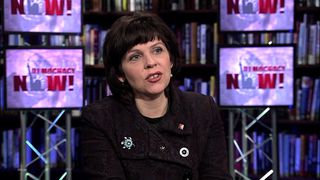
Related
Topics
Guests
- Michael Hudsonsenior editor at the International Consortium of Investigative Journalists, which published the Panama Papers.
Links
The Panama Papers leak, that reveals how the rich and powerful rely on a secretive law firm to hide their wealth in tax havens, has drawn attention to a 2011 speech by Senator Bernie Sanders against the Panama-United States Trade Promotion Agreement, which became law in 2012. He noted that Panama’s entire economic output at the time was so low that the pact seemed unlikely to benefit American workers. The real reason for the agreement, Sanders argued, is that “Panama is a world leader when it comes to allowing wealthy Americans and large corporations to evade taxes.” Sanders said the trade agreement “will make this bad situation much worse.” We get reaction from Michael Hudson, senior editor at the International Consortium of Investigative Journalists, which published the Panama Papers, and Frederik Obermaier, investigative reporter at Germany’s leading newspaper, the Munich-based Süddeutsche Zeitung. He is co-author of the book “Panama Papers: The Story of a Worldwide Revelation.”
Transcript
AMY GOODMAN: We’re talking about “The biggest leak in the history of data journalism just went live, and it’s about corruption.” That’s what NSA whistleblower Edward Snowden tweeted about the Panama Papers. Released Sunday, the papers reveal how the rich and powerful in numerous countries use tax havens to hide their wealth. Some 11-and-a-half million files were leaked from one of the world’s most secretive offshore companies, Mossack Fonseca, a law firm based in Panama. The documents were obtained from an anonymous source by the German newspaper Süddeutsche Zeitung and shared with the International Consortium of Investigative Journalists. Snowden also tweeted about the Panama Papers, saying, “The story behind the #PanamaPapers? Courage is contagious.”
We’re joined by Frederik Obermaier, Süddeutsche Zeitung's leader—reporter and one of the lead reporters on this story, and Michael Hudson of the International Consortium of Investigative Journalists. I wanted to turn to Bernie Sanders. This isn't during this year, but this is Bernie Sanders speaking in October of 2011 during a debate on the Senate floor over the Panama-United States Trade Promotion Agreement. The pact became law the next year, but in 2011 Senator Sanders laid out his opposition in a speech some say [predicted] the new Panama Papers project.
SEN. BERNIE SANDERS: Panama’s entire annual economic output is only $26.7 billion a year, or about two-tenths of 1 percent of the U.S. economy. No one can legitimately make the claim that approving this free trade agreement will significantly increase American jobs. Then, why would we be considering a stand-alone free trade agreement with Panama, tiny little country?
Well, it turns out that Panama is a world leader when it comes to allowing wealthy Americans and large corporations to evade U.S. taxes by stashing their cash in offshore tax havens. And the Panama free trade agreement will make this bad situation much worse. Each and every year, the wealthiest people in our country and the largest corporations evade about $100 billion in U.S. taxes through abusive and illegal offshore tax havens in Panama and in other countries. So, according to Citizens for Tax Justice—and I quote—”A tax haven … has one of three characteristics: It has no income tax or a very low-rate income tax; it has bank secrecy laws; and it has a history of non-cooperation with other countries on exchanging information about tax matters. Panama has all three of those. … They’re probably the worst.”
AMY GOODMAN: That was Bernie Sanders—not now, but in 2011. Michael Hudson, was he predicting what we’re seeing today? And what is the role of the U.S. in all of this?
MICHAEL HUDSON: Well, I don’t know if he was predicting what we see today. He was sort of describing the situation. Panama is one of the world’s biggest secrecy havens. It has laws that make it difficult—if you’re an investigator, an attorney or even an ex-spouse trying to find out about someone’s assets, it’s very difficult to go to Panama, just as it’s very difficult to go to places like the British Virgin Islands or the Caymans, and get that information. And that’s what makes it so valuable as a haven for people, and that includes Americans, like Ponzi scammers and fraudsters and just folks who are trying to reduce their taxes. That’s why they go to companies like Mossack Fonseca. That’s why they go to places like Panama.
AMY GOODMAN: So, talk about the role of the United States. Talk about, well, where we are right now.
MICHAEL HUDSON: Well, you know, it’s very interesting. You know, there are lots of Americans who are going overseas trying to—trying to hide their money or move their money to avoid taxes or avoid criminal investigations. But on the other hand, you know, you can argue that the world’s biggest tax havens are islands, but they’re Great Britain and Manhattan. Both London and New York are places where lots of money, you know, is hidden, both in real estate and in banks. You know, if you’re trying to—you know, if you’re the brother-in-law of a dictator in a developing nation, you will have an entity—you will have a company based in the British Virgin Islands or Panama or somewhere like that, but your money’s not going to be there. The company that you own is going to be the front for you that will allow you to have your money in a bank, so that you and your family can do shopping trips, you know, in Manhattan.












Media Options